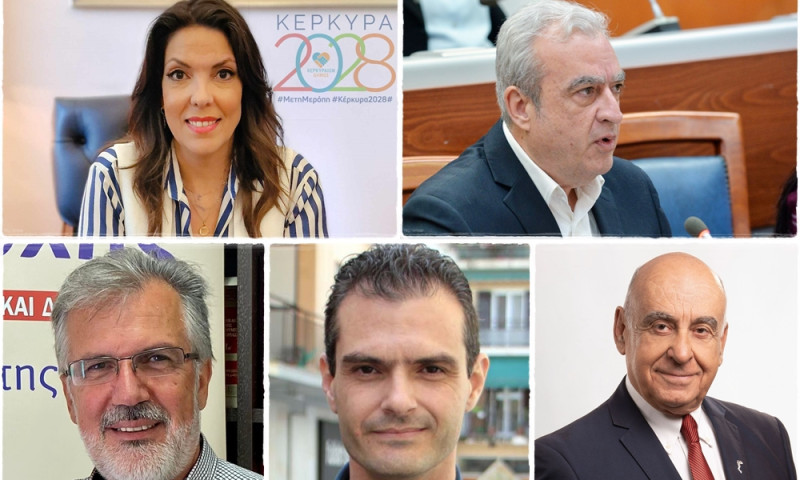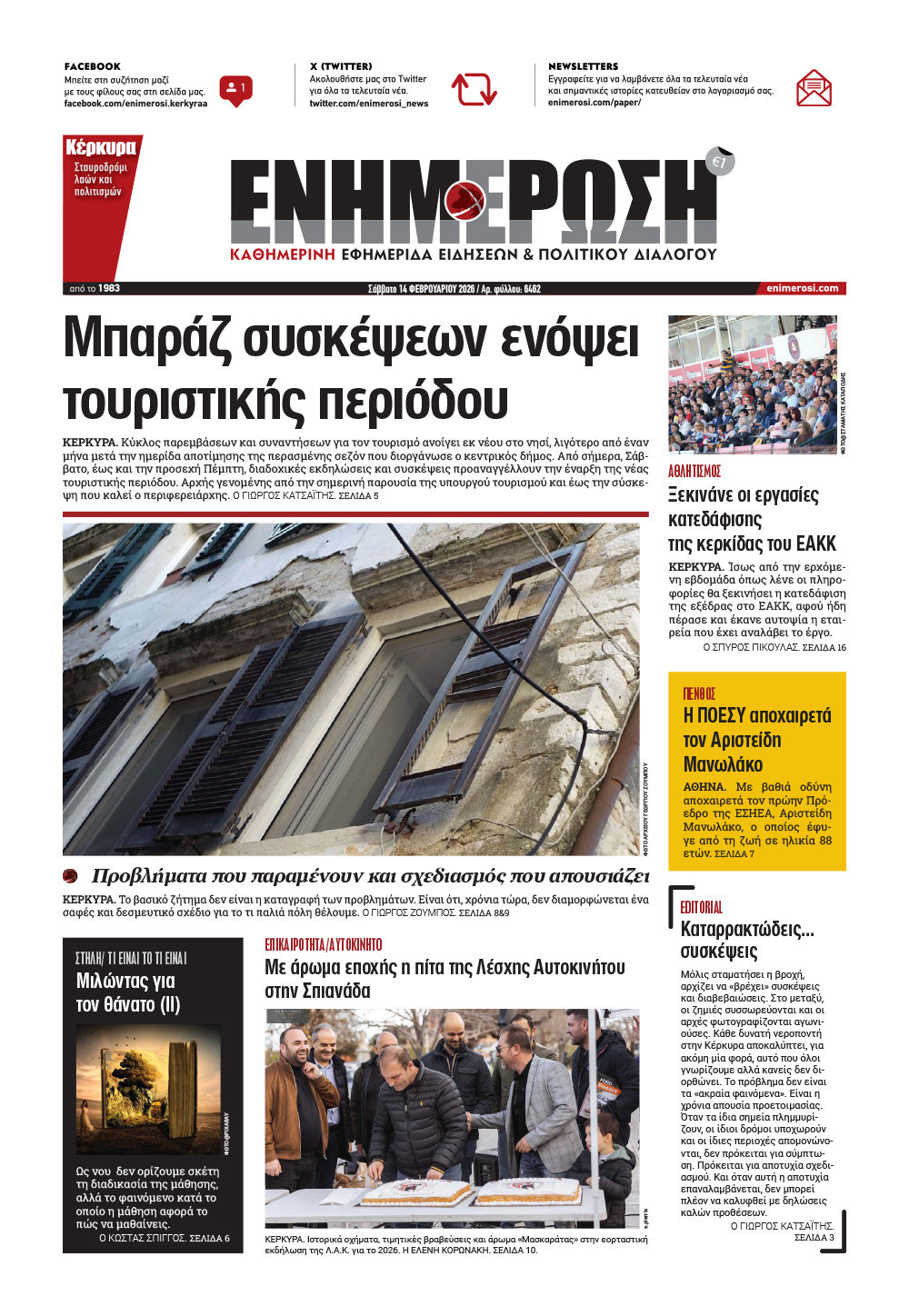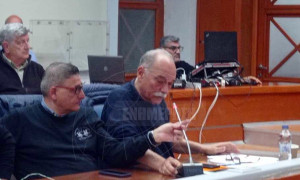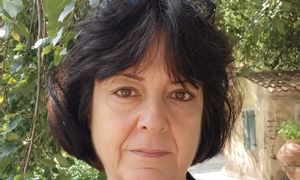The five Central Corfu mayoral candidates answer questions from Enimerosi

CORFU. Borbotis, Karydis, Metallinos, Poulimenos and Ydraiou outlined their positions on four key topics ahead of the local elections on Sunday 8 October.
Five parties are competing for people's vote in the local elections in Central Corfu. The countdown has already begun for the elections on October 8th, the outcome of which will determine whether we will have a new municipal authority from the first Sunday or if elections will be held again on October 15th. In order to best inform voters, Enimerosi invited the five mayoral candidates to address four key topics: town character and appearance, waste management, traffic and water supply & sewage.
In alphabetical order, the mayoral candidates for Central Corfu and Diapontia Islands are Yiannis Borbotis (Laiki Sispirosi), Giorgos Karydis (Kerkyraiki Symmahia), Takis Metallinos (Allazoume Rota), Stefanos Poulimenos (Exarhis) and Meropi Ydraiou (Corfiot Municipality-Corfu 2028).
In essence, this is the first official "public discussion" of the five contenders, with the goal being to inform citizens and provide them with an opportunity to compare positions shortly before they cast their votes.
TOWN CHARACTER AND APPEARANCE
What is the overall character of the town you want, considering that licences that have been granted for the placement of tables and chairs, merchandise etc. are being violated by business owners, controls are not being carried out - or if they are, they are insufficient - giving the impression that there is no consideration for basic living conditions for residents. Additionally, do we want the historic centre to be accessible or not, given that the restriction on vehicle traffic in August faced opposition?
Yiannis Borbotis: The character of the town stems from the policy that treats the Old Town as a tourist product, disregarding the lives of residents, workers, professionals and visitors. In this development model, there is chaos, while the effort to ensure genuinely free and communal spaces (squares, pavements and pedestrian areas) is absent.
A characteristic example of class management is that professionals are taxed for outdoor seating based on square footage rather than turnover. Through comprehensive consultation and an integrated plan, measures can be taken to prevent the entry of vehicles into the historic centre. We are fighting for the satisfaction of the people's needs against the policy that serves the profit of the few, and we have been doing so up to now.
Giorgos Karydis: Corfu Town must be accessible to all residents and visitors for historical, social, cultural and professional reasons. The use of public spaces and municipal roads must be carried out in compliance with rules set by the Municipality, which will also be responsible for their enforcement. Unauthorized activities, illegal occupation of pavements and violations of usage permits will be monitored either by competent municipal officials or by municipal law enforcement. Upon the first observation of irregularities, a notice for immediate compliance will be issued. If this is not carried out, those responsible will face penalties.
Care must also be taken to ensure the well-being and tranquility of the town's permanent residents through the observance of rules of social responsibility.
Takis Metallinos: In the town, residents live, businesses operate and thousands of tourists visit. Its capacity is limited and we cannot accommodate, for example, the 55,000 rental cars in the summer season. Pedestrianisation has proven to increase the turnover of businesses and create more humane conditions for everyone.
The solution lies in the use of alternative individual or mass transportation means, such as bicycles, mini-buses, etc., with simultaneous provision of designated parking spaces for permanent residents. Any summer measures can be effective, provided there is extensive preparation by both the municipal and police authorities and the citizens themselves. It cannot be an election fireworks display announced one night and implemented under pressure the next... The use of outdoor seating should be equally considerate. Their unregulated spread does not show respect for the cultural character of the town, does not help its functioning and rebounds on the businesses themselves.
Stefanos Poulimenos: The development of outdoor seating and merchandise in the old town has two dimensions: aesthetic and functional.
For the aesthetic aspect, there will be consultations with professionals within the framework of a new regulation for managing the old town to find a realistic and mutually acceptable solution on equal terms that will improve the overall appearance and be in the interest of the professionals themselves.
As for the functional part of the matter, we will start with the obvious:
-
Ensuring unobstructed pedestrian movement for locals and visitors by maintaining the necessary width of the road.
-
Not obstructing the passage of essential vehicles (ambulances, fire engines etc.).
-
Unobstructed conduct of religious and other ceremonies, such as processions, funerals, parades etc.
We expect the cooperation of professionals in addressing the remaining issues that need to be regulated based on their licences.
The Historic Centre of the town must have limited accessibility while ensuring access for permanent residents and exceptions for public transportation. Restrictive measures for others are necessary but require arrangements with the provision of peripheral parking areas and transportation of drivers and passengers to and from the town, with frequent schedules of small and flexible buses.
Meropi Ydraiou: The measure to restrict vehicle traffic during peak hours in the historic centre has been successful. The majority welcomed it, as it brought back a more human pace to the town centre.
We do not accept traffic chaos in the historic centre of Corfu. This measure is just the beginning.
The Sustainable Urban Mobility Plan is the major change that this municipal authority has associated with its first term. It is the roadmap for a more human and beautiful town, including bars, redevelopment, pavements, permanent parking spaces for permanent residents, pedestrian facilitation, cycling - human pace everywhere.
By 2028, the image will have completely changed through the Sustainable Urban Mobility Plan, and the Historic Centre will be more human, offering a high quality of life.
Most importantly, life and human activity will coexist in the Historic Centre. A co-existence based on communication, respect and accepted rules. In addition, the renovation of the wooded areas in Garitsa and Anemomylos has beencompleted, and we are planning the renovation of the wooded area by the prison.
WASTE MANAGEMENT
Even now, rubbish continues to be transported off the island and will continue until the waste processing facility is constructed, which is still in the competitive bidding process. At the same time, the Municipality of Central Corfu, being the most populous, is also the largest producer of waste on the island. In the past four years, there has been progress in waste management. What are the solutions you propose as a candidate municipal authority?
Yiannis Borbotis: In the past four years, the unacceptable waste management situation has continued with the privatisation of part of the waste collection, minimal recycling rates, the absence of a reduction plan for waste generation and the enormous cost of transporting waste, which is being deducted from other public needs. The municipal authority acted within the framework established over time by governments through laws that prohibit hiring, reduce state funding, promote cost recovery, and increase local taxes, all while undermining municipal services and benefiting large contractors.
Laiki Sispirosi prioritises waste management based on the needs of the people, with an emphasis on waste prevention, sorting at source, including organic waste composting, all without private sector involvement and with respect for the environment and public health.
Giorgos Karydis: We believe that during the past four years, there has been no progress in addressing the waste management issue. The construction of the waste treatment plant, which should have already been completed, hasn't even started, despite everything being ready in 2019, including the study, funding and construction site.
The cost of transporting waste off the island is enormous, hindering the municipality from carrying out necessary municipal projects and services. This is happening because the municipal authority neither demanded the resources it is entitled to, nor took care of recycling and reducing the volume of waste.
The immediately necessary interventions are:
a) Vigorous pursuit of the resources owed to the municipality by the Central Government.
b) Sorting at source.
c) Self-funded recycling programme to reduce waste volume and the enormous transportation costs.
d) Placement of separate recycling bins.
e) Emphasis on public education and involvement.
Takis Metallinos: Waste management is one of the main failures of the outgoing municipal authority. They swept the problem under the rug by transporting waste off the island. However, this comes at a high cost to the residents. Projects and services in culture, education, healthcare, infrastructure, and many other areas are not taking place because millions of Euros are dumped into landfills every year. Even the ready solution of outsourcing waste management was wasted due to the incompetence of those in charge.
Our proposals revolve around the immediate completion of the waste treatment plant with parallel sorting at source. The public should be educated about waste separation, and, of course, we should adopt ready-made solutions that provide incentives and benefits to all those who participate in product recycling.
Stefanos Poulimenos: Progress in waste management is primarily judged by the recycling rate, which, according to official data, is slightly above 6%, as opposed to the target of 50% set by the current municipal authority in 2019 for the end of this four-year period, which is now.
Our party has set as its primary goal the promotion of sorting at source within the principles of a circular economy, in order to significantly reduce the volume, weight, and cost of transporting waste off the island.
This choice follows decades of European practice, European Directives and the National Waste Management Plan. When implemented with a reliable plan, consistency and stability, it will contribute to improving the relevant indicators of the municipal budget and better serving the daily needs, at the expense of which the current system of costly transportation of almost all waste off Corfu has been operating.
Meropi Ydraiou: We must remember the nightmare images with the rubbish that we experienced in the past so as not to relive them.
I must remind you that when I said that the only feasible and realistic solution is the transportation of waste, some told me it couldn't be done.
We have proven that it can be done, and it was done! Moreover, it was accomplished without any increase in fees paid by the citizens. We have transported over 100,000 tons of waste. The municipality now has 36 new vehicles and waste collection trucks through leasing and the "PHILODIMOS" and ESPA programmes, and two street sweeper vehicles have been put into operation. The Waste Transfer Station is now operational, and we have procured 500 new green bins, 250 traditional clay bins, 270 new recycling bins and 70 new large bins within the first three years of our tenure. The tender for the supply of 1,200 plastic waste bins is also in progress.
We have procured 1,800 plastic composting bins, 3,800 kitchen waste bins and 1,000 mobile bins for kitchen waste. Recycling infrastructure has been created in all administrative boundaries of our municipality, not just in Corfu Town. We created 8 new municipal recycling streams from scratch; none of these existed before.
With the KERKYRA 2028 Plan, our programme for the next five years, we now focus on neighborhood cleanliness. We distribute street cleaners and cleaning workers throughout the town and municipal residential areas. We have created a new Direct Action Service for Cleaning, which will intervene immediately for cleanliness issues, with telemanagement and monitoring of waste collection vehicles and sensor installation on bins that will automatically notify for optimal routes.
TRAFFIC
Within the administrative boundaries of the Municipality of Central Corfu, there are major road arteries that pass through it to reach the town. What are the immediate measures you will take to alleviate traffic congestion not only in the town centre but also in the surrounding areas? Are you willing to exert pressure on the Ionian Islands Regional Administration, to carry out the necessary projects that have been announced for years but have not yet been seen?
Yiannis Borbotis: The road arteries you mention make up the tragic road network of Corfu, which thousands of people traverse daily, with the risk of accidents ever-present. Corfu's roads reflect the long-standing policy of neglecting the people's needs, prioritising expedience, fragmented efforts and questionable quality of work. A telling example is the recent measurements at Tria Gefyria, which inconvenienced thousands of drivers and passengers, or the ad-hoc traffic measures during the summer.
What is needed is a comprehensive plan within the framework of a different policy that cares about the needs and safety of the people. Elements of such a plan include creating parking facilities outside the town and providing free transportation to the town centre. Attention to parking spaces is also required for many villages within our municipality. Laiki Sispirosi guarantees that it will take the lead in advocating for and implementing such projects, as it has done in the past.
Giorgos Karydis: Traffic congestion is a daily problem that, instead of being resolved, is worsening. It is imperative to immediately relieve the town centre of its traffic burden by constructing bypass roads and peripheral traffic networks. The regional authority must take on this project within its jurisdiction, applying the necessary pressure and collaborating with the municipality.
The delay on the part of the municipality in creating periphera parking areas at the town entrances is completely unjustified. Regular municipal minibus routes to the town centre and back to the parking areas are needed. Additionally, parking facilities for cars in the town centre (e.g., San Rocco) need to be established, and free parking spots for permanent residents should be ensured.
Takis Metallinos: Traffic congestion is one of the primary issues in Corfu, which continues to grow due to the thousands of cars being added to the island each year. The poorly maintained road network and the lack of substantial repairs and maintenance exacerbate the problem. The local and regional governments are interdependent and not competitive. They should collaborate to create new bypasses, necessary intersections, roundabouts, peripheral parking lots connected via mini-buses, and any other interventions that science offers to make daily life more humane for everyone.
Urban planning at the town limits, the creation of networks in areas that have been alienated for decades, should have been completed yesterday. Urban development leads to new residences, shops, and the transformation of entire areas. It is a third-world characteristic to follow urban developments instead of planning them.
Stefanos Poulimenos: The traffic problem in Corfu is explosive and makes life unbearable for both locals and visitors, especially in the town and at its entrances and exits.
We see consultations upon consultations, but in practice, nothing happens. No new roads, no new parking spaces, while the available spaces are constantly decreasing, especially during a period of rapid increase in the number of vehicles.
To the question of what we will do, we respond that we will prioritise the urgent need for:
- Widening and enhancing safety conditions on the connecting municipal road Tria Gefyria - Kampanioli.
- Constructing the inner town ring road, starting from Platitera, passing by the Metropolitan "Conference Centre," and through the inaccessible new Municipal Units within the General Urban Plan, exiting in Garitsa.
- Collaborating with the Ionian Islands Regional Authority for the rapid auction of the new alignment of the Tria Gefyria - Vrioni road, which will alleviate traffic conditions in the most problematic part of our road network. The same will apply to the Skripero bypass, while we will fight with the Ministry of Transportation and Networks for the long-forgotten Benitses bypass.
Simultaneously, we will create new peripheral parking areas with the immediate transportation of passengers using modern minibuses to and from the town.
It is worth mentioning that we are planning to reconsider the underground parking project at San Rocco Square, for which there is already investment interest.
Meropi Ydraiou: We will not limit ourselves to exerting pressure on the central authority, as we have proven that we can do it successfully.
We will seek a new, collaborative framework not only with the Regional Authority, but also with all the involved services and bodies to advance the significant changes and reforms included in the KERKYRA 2028 Plan.
The first peripheral parking area is in progress and nearing completion. Following this, there will be the site allocation and a tender for the construction, development and operation of two more peripheral parking facilities.
We do not settle for inaction and passivity; we have demonstrated courage, as evidenced by the measures taken this summer.
Critics argue that parking spaces should have been created first, and then traffic restrictions should have been implemented. These remarks come from individuals with experience and a public presence as mayors, deputy mayors and prefects who seek to regain the votes of citizens.
Let them tell us how long this would take and, most importantly, why they didn't do it themselves for so many years. If we accept this argument, it would mean that we don't want to change anything, and we wouldn't have done anything either. On the contrary, we have made a start and will continue with bigger and bolder steps. Because we have the knowledge, a plan and the determination to implement it.
WATER
Can DIADEYAK ensure its sustainability by collecting the outstanding amounts owed by consumers?
Yiannis Borbotis: DIADEYAK, like all Water Supply and Sewerage Companies, operates on a cost-benefit basis as a business. They do not provide water as a social good but as a commodity with high charges and subpar services. At the same time, it faces the well-known problems due to the age of the network and the subsequent over-extraction, the "gentle" treatment of major debtors-major entrepreneurs and the excessive expenses for electricity.
The familiar tactic of devaluation of this service has once again been used as an excuse by the state and the municipal authority to hand it over to the private sector for nearly 30 years. It's a classic example of how profit for big entrepreneurs should emerge from meeting the people's needs. We propose treating water as a social good, with the aim of lightening the burden on the general population, covering their needs with cheap, quality and drinkable water.
Giorgos Karydis: Our party considers it a fundamental human right for the residents of our municipality, as well as all fellow citizens, to have access to drinking water with state funding and public management of water supply and sanitation. Thus, a struggle is required both for the construction of the Dam project with state funding and for the maintenance and smooth operation of DIADEYAK.
A crucial prerequisite for the sustainability of DIADEYAK is the collection of outstanding amounts, especially from major debtors, who, with the unjustifiable tolerance of the Municipality, are pushing DIADEYAK towards disappearance. The previous municipal authority not only saved DIADEYAK by collecting unpaid bills but also left it with 2,000,000 Euros in 2019 when it was handed over to the current one, while today it has a huge financial deficit! The sustainability of DIADEYAK is achievable, as long as there is the political will for it.
We assure our fellow citizens that if they choose us to take over the administration of the Municipality of Central Corfu and Diapontia Islands, all of the above are commitments and priorities for us.
Takis Metallinos: DIADEYAK has been, since its establishment, the largest public enterprise in the town. Its networks, apart from being highly complex in some cases, are also centuries-old..l. It is a living organism that is not allowed to die, not even to weaken. Biological purification is the most significant environmental project that has been carried out on the island in the last century. Debts, especially the debts of major consumers, constitute a ticking bomb at the foundation of the enterprise. Their collection has proven to be not a technical matter but a political one. Public organisations as well as large businesses should understand that paying their debts is a matter of respect for society itself and the civilised way in which it is structured. The functioning of the town should be based on rules that everyone respects and should cease to be à la carte.
Stefanos Poulimenos: DIADEYAK today or possibly DEYAK tomorrow will face difficulties, but with some adjustments, it will be able to ensure its sustainability, provided that its operation is reorganised and rationalised.
The Water Supply and Sewerage enterprise will be able to stand on its feet if the outstanding debts accumulated over the years, which were mainly its responsibility, are collected; if its expenses are rationalized; if the direct awarding of contracts is limited; if the compliance with the terms of its contracts with contractors is monitored; if the orgy of corruption is curtailed and if scandalous settlements for the debts of major debtors are restricted.
In other words, it will turn a page the vote of the citizens in the upcoming municipal elections on Sunday.
Meropi Ydraiou: The outlook and future of DIADEYAK are not only linked to the collection of outstanding amounts but also to the efficient management of resources, the reduction of water losses, the replacement of the deteriorated network and the improvement and provision of quality services to the citizens.
Essentially, with the division of the unified Municipality, we were faced with a new and challenging reality. During this four-year period, we changed both the framework and the orientation of DIADEYAK.
To recap, the desalination project units were contracted, which will provide clean water to our town. Leakage in the network was reduced through the installation of an electronic system, and the water supply networks were replaced in the Municipal Districts of Parelia and in Phaiaces, Achillio and Paleokastritsa, as well as in suburban areas of the town. Furthermore, the town's biological treatment plant was upgraded, a project with a budget of 3.5 million Euros, which we continued from the previous period and successfully completed!
We have accomplished what should have been done in previous years.
And the best is yet to come. The desalination project in Chrysida, which will provide drinking water to our town, is commencing immediately.
Additionally, the largest project ever undertaken in Corfu, the dam project, is in the implementation phase with a budget of 181 million Euros. This project provides a permanent and definitive solution to the water supply problem.
Furthermore, the new major goal is the complete replacement of the water supply network, which we inherited in a terrible condition because its infrastructure dates back to the previous century. We will replace the entire deteriorated network and I assure you that everything I say and set as a goal, I turn into action.
MARIA BAZDRIYIANNI












